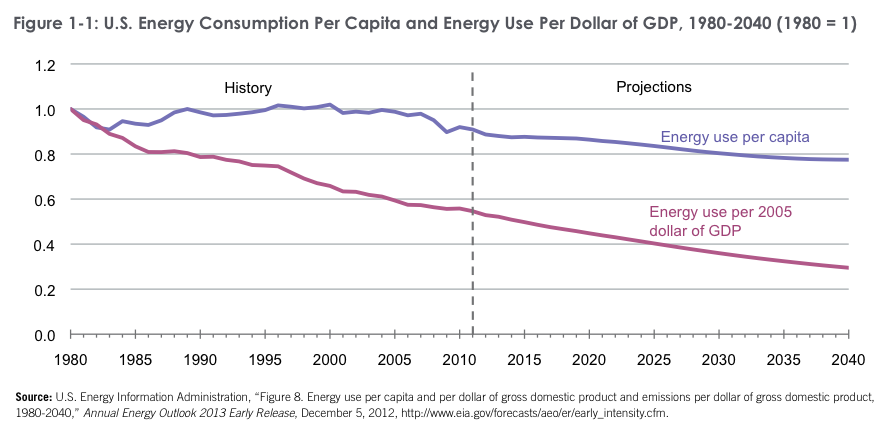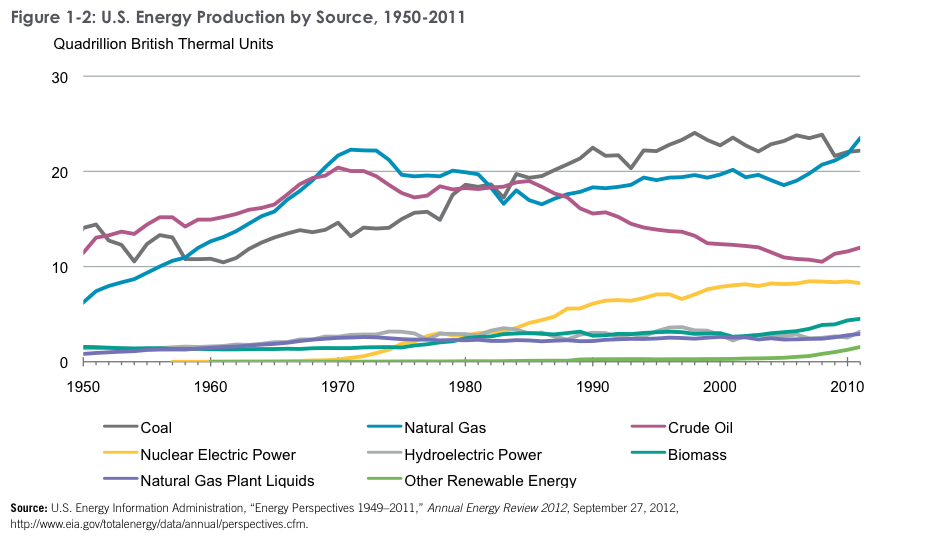BIPARTISAN POLICY CENTER
Executive Summary
As the United States struggles to emerge from a historic recession, energy has emerged as both a bright spot and a source of ongoing challenges for the nation’s long-term prosperity and security. On the one hand, when adjusted for economic growth and inflation, the United States has cut its energy needs by more than 50 percent since 1973, and the trend shows no signs of slowing. Treating this 40- year reduction as the equivalent of new energy supply, the resulting resource is significantly larger than the expansion of output from all other energy resources combined over the same period. In addition, there have been major positive developments on the supply side: Domestic oil, natural
gas, and renewable energy production are up, while energy imports are down; new energy development is driving a jobs boom in many parts of the country; and lower energy costs are helping the U.S. manufacturing sector recover.
The combination of these trends means that the nation is arguably more energy secure than it has been in more than a generation. But the news is not all good: Affordable energy is still a challenge for many households and businesses; the oil and gas boom comes with environmental challenges; the electric grid faces hurdles in upgrading infrastructure and integrating new renewable sources; public research and development (R&D) in energy is insufficient to maintain an international competitive edge; and the issues of climate change, global energy market volatility, and competition for energy resources by countries with growing economies remain.
The Strategic Energy Policy Initiative, a project of the Bipartisan Policy Center (BPC) and led by a diverse 20-member Energy Board, was launched in 2011 to build the bipartisan consensus needed to tackle these challenges in the years ahead. Americans are fortunate: The nation has enormous energy strengths, greatly exceeding those
of most industrialized nations. Building on these strengths to deliver affordable, secure, and reliable energy in an environmentally responsible manner is the overarching goal of the recommendations outlined in this report. Specifically, we, the Energy Board, believe U.S. energy policy should be designed to advance four core objectives:
(1) pursue a diverse portfolio of energy resources;
(2) improve the energy productivity of the U.S. economy;
(3) accelerate innovation and technology improvements across the energy sector;
(4) improve energy policy governance and accountability.
It is important to emphasize at the outset that the actions we propose in each of these areas should be viewed as a package—no single Energy Board member necessarily agrees with each individual recommendation in isolation. Taken together, however, we believe this set of recommendations provides the blueprint for a balanced and effective plan
for enhancing the nation’s prosperity, energy security, and sustainable environmental quality in the 21st century.
A critical energy and environmental policy issue is whether the United States should adopt a comprehensive climate change policy to reduce greenhouse gas emissions. We agree that climate change is a significant issue and addressing it can and should be a matter of bipartisan consensus. It is our view that government policy development and prudent business planning should incorporate cost-effective greenhouse gas emissions reductions, and support market-based efforts to accelerate the integration of low-carbon energy technologies. We call on Congress and the Administration to find a way forward together on responsible and efficient policies to reduce greenhouse gas emissions and to work with other governments in seeking a global approach that both promotes the most cost-effective emissions reductions and addresses the competitiveness issues associated with carbon policy. We look forward to assisting the effort.
Read full report (PDF) here: America’s Energy Resurgence
About the Bipartisan Policy Center
bipartisanpolicy.org
“The Bipartisan Policy Center (BPC) drives principled solutions through rigorous analysis, reasoned negotiation, and respectful dialogue. Founded in 2007 by former Senate Majority Leaders Howard Baker, Tom Daschle, Bob Dole and George Mitchell, BPC combines politically-balanced policymaking with strong, proactive advocacy and outreach.”








 RSS Feed
RSS Feed